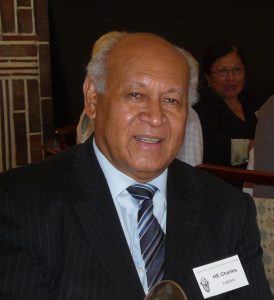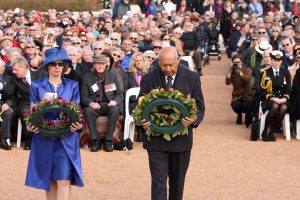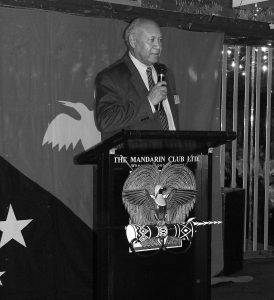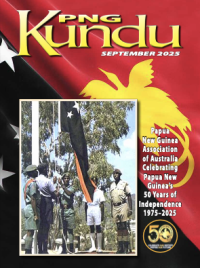Vale Sir Charles Watson Lepani, KBE CBE OBE (28 October 1947 – 10 January 2025)
 The Papua New Guinea Association of Australia (PNGAA) is greatly saddened to hear of the death of Sir Charles Lepani.
The Papua New Guinea Association of Australia (PNGAA) is greatly saddened to hear of the death of Sir Charles Lepani.
Sir Charles was a tremendous supporter of the PNGAA over his many years as PNG High Commissioner to Australia based in Canberra from 2005 to 2017.
He was humble, articulate, a gentleman with a wonderful sense of humour, passionately committed to the people-to-people links between Australia and PNG, and was a dear friend to many Australians and Papua New Guineans.
A few special highlights of his connection with PNGAA were his interest in and attendance at many PNGAA and Rabaul & Montevideo Maru Memorial events. He was instrumental in ensuring that the Rabaul & Montevideo Maru Memorial occurred on time by ensuring a generous donation from Papua New Guinea acknowledging the WWII losses from both Papua New Guinea and Australia.
He was a great supporter of the 2014 PNGAA ANZAC Centenary Commemorative Dinner and Symposium on 17 and 18 September 2014 titled ‘From Pacific WW1 battlefield to Pacific Powers: A Century of Australia Papua New Guinea Relations’. He also kindly participated in an interview which can be seen on PNGAA’s film ‘Kiap: Stories Behind the Medal’.
He was one of Papua New Guinea’s highest-ranked civil servants during PNG’s decentralization process from self-government in 1973 through independence in 1975. He became one of PNG’s experienced diplomats.
Sir Charles was the Director of the PNG National Planning Office from 1975 to 1980 which had tight control and management of fiscal policy. He was then 27.
 Together with Rabbie Namaliu as Chairman of the Public Service Commission, decentralising the public service, Mekere Morauta in Finance to deal with how to fund decentralisation, Anthony (Tony) Siaguru heading Foreign Affairs, they became a notorious ‘Gang of Four’. Nothing went through Cabinet without them.
Together with Rabbie Namaliu as Chairman of the Public Service Commission, decentralising the public service, Mekere Morauta in Finance to deal with how to fund decentralisation, Anthony (Tony) Siaguru heading Foreign Affairs, they became a notorious ‘Gang of Four’. Nothing went through Cabinet without them.
His parents were Sarah and Lepani Watson of the Trobriand Islands, PNG. Lepani Watson was one of the two village boys that were allowed into mission education. Lepani’s grandfather was the Chief of Vakuta Village. Lepani Watson had a limited education but greatly believed in hard work and instilled this in his son. Lepani Watson eventually moved to Port Moresby and worked for Treasury as a clerk. The family lived next to the family of Sir John Guise in Kaugere.
Charles’ father, Lepani Watson, won election as Trobriand Islands representative to the PNG Legislative Council. He was a widely loved, delight giving man and, as was his son, humble. He was significant in both the Administration and in his Hohola neighbourhood. His grassroots campaign to win the election was dissected in an influential study by distinguished anthropologist, Peter Lawrence, whose book about that campaign was later used by Sir Ebia Olewale as a primer, a how-to-do-it for his own campaign to win a seat in the House of Assembly for the PANGU Pati.
Growing up in an environment of early Methodist (now United Church) missionaries and the Australian administration in PNG had an enormous impact on Charles Lepani, both positive and negative. It gave him a great respect for authority and the law, and also how one can adapt through cultures and through life.
The Australian Government had scholarships for the top 20 students in primary school, and in 1960 Lepani was selected to attend boarding school in Australia at Charters Towers beginning in 1961.
Lepani Watson said to his son, Charles:
‘Son, this is the opportunity. Don’t let it slip. Be the first in line, be the first, be the first to have worked. Be the first to line up for this.’
In an interview with Jonathan Ritchie in July 2011, Sir Charles said:
‘When we landed I was astounded to see white people doing manual jobs. Carrying things, offloading things. And I was frightened because I didn’t know who was going to take my luggage off my plane, and to put the stairs down, so I can walk off. And so I just sat there stunned in the plane. Everybody walked off and this air hostess kind of came and said to me, ‘This is where the flight ends. That’s where you get off.’
I said, ‘But who’s… how am I going to get off and stepping on these stairs when white people have put the stairs down, and my luggage. Am I going to…’ She said, ‘No, no, no, no. They’ll bring your luggage. You go. You get out.’ So I… that was the first eye opener was seeing white people doing manual jobs. Never seen them in PNG. So I was stunned. That was a great experience.
And I got off, waiting for police to come and arrest me because… no, it was serious. I could be arrested, ’cause there’s no black people … and I’m a black person getting on the stairs, and luggage, my luggage, was being collected by white people. So that was a stunner. That still sticks out in my mind [and was] the decolonisation of my mind sort of in a sense.
And, and the high school in Charters Towers was another… it’s, it’s a milestone for me. It made me who I am’
Sir Charles made many great life-long friends at school in Charters Towers. He acknowledged being good at both schoolwork and sport earned respect, and he was welcomed into the homes of the local families, to farms and to cattle and sheep stations. He learned to ride a horse during this period.
The University of PNG had its first cohort in 1966 and, after schooling in Charters Towers, Sir Charles returned to PNG to university in 1967, for two years. He was the first recipient of a scholarship awarded by the ACTU and the Papua New Guinea Public Service Association to attend the University of New South Wales.
Distinguished PNGAA colleague, Paul Munro AM, recalls ‘Eminent industrial relations academic, always colourful Professor Bill Ford, whenever the opportunity presented, shared fond memories of Charles as his energetic and engaging young student on the Kensington campus and surrounds.’
With the transition to self-government in PNG in 1971-1973, Sir Charles was called back to PNG by the PSA who suggested he complete university in PNG.
Sir Charles considered his role in nation building, especially from PNG self-government, leading to independence in 1975, as a true highlight of his life. The enthusiasm, and sense of excitement was unique.
He said ‘I suppose the closest you could come to it is when you talk to some expatriate Kiaps, who go out in the jungles, take patrols, that sense of nation building. For us, its independence.’
When Sir Charles met many of the Australian kiaps, through the PNGAA, and whilst living in Canberra as PNG High Commissioner to Australia, he often encouraged them to write their stories.
He said: ‘What you did is part of our history. So it’s important you put it in writing for future generations, both Papua New Guineans and Australians, to learn how PNG came to being what it is today.’
Sir Charles was keen that there be an ongoing discussion about PNG today. He believed it was the right of Australians to do this ‘because today’s PNG’s your creation also’ .
Sir Charles’ role as head of the PNG National Planning Office involved him in the formulation of PNG’s post-independence macroeconomic policy and public sector planning system, including aid coordination.
Sir Charles said: ‘… the team was amazing. And the air of what it is together to build a young nation, white and young Papua New Guineans, who were just coming out with first degrees, no experience. But having to run an organisation with the support of also young expatriates.’
After five or six years in the Planning Office Sir Charles resigned and went to the US to get his Masters Degree in Public Administration at the John F Kennedy School of Government at Harvard. Returning to PNG he ran his own consultancy business for eight years, whilst starting a family. He was one of the first two consultants in the private sector and it gave him experience in surviving in challenging circumstances. He eventually got some work for the Australian PNG government and with the provincial governments.
By 1986, Sir Charles was invited to head up Pacific Islands Research Program, PIRP, and did so for five years. He noted this was a great experience getting to know the Pacific Islands.
Sir Charles then served as PNG’s Ambassador to the European Union from 1991 to 1994.
On his return to PNG Sir Charles ran the Minerals Development Corporation for the state’s assets. ‘And was stunned to see how that wasted…[that PNG was] living in debt, getting money from joint venture partners to finance our equity.
Sir Charles knew, from his days in the Planning Department, that fiscal self-reliance for PNG was an important national goal of an independent nation.
It was realised that PNG could benefit from its assets. This resulted in five years of work partially floating the states assets. These were eventually sold to Oil Search, to employ the LNG Project, with the aim of reducing Australian aid.
In the midst of negotiations there was the Sandline Affair. Sir Charles had to convince international investors of the stability of the country and that PNG was a constitutional democracy, and that a commission would sort what went wrong with Sandline.
His final roles were as Director-General of the 2018 APEC Authority in Portt Moresby and more recently as Chair of the Eminent Persons Group that worked on the Foreign Policy White Paper.
 Sir Charles was a great friend of the PNGAA, particularly during his time as PNG High Commissioner to Australia.. He always wished to spark interest, academic and research interest, in PNG by Australian students and scholars. And similarly with PNG students. In his role as PNG High Commissioner to Australia, he advanced education by speaking at schools and encouraging the schools to have close relationships with schools in PNG.
Sir Charles was a great friend of the PNGAA, particularly during his time as PNG High Commissioner to Australia.. He always wished to spark interest, academic and research interest, in PNG by Australian students and scholars. And similarly with PNG students. In his role as PNG High Commissioner to Australia, he advanced education by speaking at schools and encouraging the schools to have close relationships with schools in PNG.
Sir Charles knew that the road from independence would be both exciting and challenging. He well understood the available capacity at independence, that people with little experience had to run a new country, building leaders, building the nation.
It was important to Sir Charles that his roles and experiences were both successful and enjoyable. He believed in equitable growth and development for Papua New Guinea.
He greatly respected those Australians who were in PNG to help the new nation transition. This respect was mutual.
Sir Charles had a lifelong passion and dedication to his nation of PNG and its people, as well as a strong belief in the Australian PNG relationship. He represented PNG internationally and domestically, with great distinction. His commitment to PNG and ensuring a common national identity will be a lasting legacy.
In keeping with his wishes, there will be no haus krai. A memorial service will be announced in due course.
The Papua New Guinea Association of Australia feels an enormous loss and extends its heartfelt sympathy to Dr Katherine Lepani and the family.
* * *
Note: Sir Charles Lepani kindly attended many PNGAA events including:
– 2013, 2014, 2015, 2016 | attended the annual PNGAA Christmas luncheons
– 14 June 2015 | Sir Charles and Dr Katherine Lepani attended the launch of PNGAA’s film KIAP: Stories Behind the Medal at the Roxy Theatre, Lindfield. Sir Charles was again interviewed as part of this film.
– 17 September 2014 | Attended the 2014 PNGAA ANZAC Centenary Commemorative Dinner And Symposium: From Pacific WW1 battlefield to Pacific Powers: A Century of Australia Papua New Guinea Relations, where the then Hon. Julie Bishop, MP, Minister for Foreign Affairs and Deputy Leader of the Liberal Party, officially representing the Hon. Tony Abbott, MP, Prime Minister of Australia, gave an address and said: ‘…High Commissioner Charles Lepani—a dear friend, a great supporter and somebody to whom I look for advice, on many occasions, in relation to the PNG-Australia relationship,…’
– 2013 | Attended PNGAA’s Christmas Luncheon where Sir Charles was interviewed for the PNGAA production of KIAP: Stories Behind the Medal.
– 1 July 2012 | At the dedication of the Rabaul & Montevideo Maru Memorial at the Australian War Memorial in Canberra, PNG High Commissioner to Australia Sir Charles Lepani presented a wreath, alongside President of the Papua New Guinea Association of Australia, Andrea Williams.
– 11 October 2011 | Visited the Australian War Memorial with then PNG Prime Minister, the Hon Peter O’ Neill.
– The visit included a presentation payment on behalf of the PNG Government to the Rabaul and Montevideo Maru Society as a contribution from Papua New Guinea to the Rabaul & Montevideo Maru Memorial, a very significant gesture to Australia and the Society. The visit included an official welcome by the Director of the AWM, the laying of a wreath, a short look around, a stroll over to the Rabaul and Montevideo Maru Memorial site , meeting members of the PNGAA and NGVR/PNGVR Association members attending.
– 2 July 2011 | Attended the Rabaul and Montevideo Maru luncheon at the National Press Club in Canberra.
– 20 November 2010 | Attended the Sharing Histories: Kiap tribute event at the National Archives of Australia
– 21 June 2010 | Attended the Australian Parliament historic debate and resolution on Rabaul and the Montevideo Maru in Canberra, ACT.
* * *
With grateful thanks to an interview of Charles Lepani done by Jonathon Ritchie on 13 July 2011 for the Oral History and Folklore Collection conducted by the National Library of Australia.
https://nla.gov.au/nla.obj-220254691/listen
Andrea Williams 12 January 2025


